Intravascular compartment - Study guides, Class notes & Summaries
Looking for the best study guides, study notes and summaries about Intravascular compartment? On this page you'll find 1331 study documents about Intravascular compartment.
All 1.331 results
Sort by
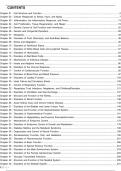 Popular
Popular
-
TEST BANK ESSENTIALS OF PATHOPHYSIOLOGY (4TH EDITION BY PORTH)
- Exam (elaborations) • 263 pages • 2024
-
- $15.49
- 2x sold
- + learn more
TEST BANK ESSENTIALS OF PATHOPHYSIOLOGY (4TH EDITION BY PORTH) CONTENTS Chapter 01 - Cell Structure and Function .......................................................................................................................... 2 Chapter 02 - Cellular Responses to Stress, Injury, and Aging .......................................................................................... 7 Chapter 03 - Inflammation, the Inflammatory Response, and Fever ..............................................
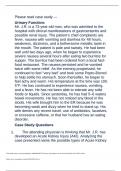 Popular
Popular
-
(Answered Case study) Mr. J.R. Is A 73-Year-Old Man, Who Was Admitted To The Hospital With Clinical Manifestations Of Gastroenteritis And Possible Renal Injury.
- Exam (elaborations) • 5 pages • 2024 Popular
-
- $9.99
- 1x sold
- + learn more
The diagnostic evaluation can be used to classify acute kidney injury as prerenal, intrinsic renal, or postrenal. The initial workup includes a patient history to identify the use of nephrotoxic medications or systemic illnesses that might cause poor renal perfusion or directly impair renal function. Physical examination should assess intravascular volume status and identify skin rashes indicative of systemic illness. The initial laboratory evaluation should include measurement of serum creatini...
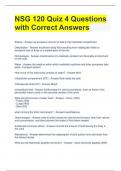
-
NSG 120 Quiz 4 Questions with Correct Answers
- Exam (elaborations) • 13 pages • 2023
- Available in package deal
-
- $12.49
- 2x sold
- + learn more
NSG 120 Quiz 4 Questions with Correct Answers Edema - Answer-an excessive amount of fluid in the interstitial compartment Dehydration - Answer-insufficient body fluid resulting from inadequate intake or excessive loss of fluids or a combination of the two Homeostasis - Answer-maintenance of a relatively constant and favorable environment for the cells Water - Answer-the medium within which metabolic reactions and other processes take place. Transport system How much of the adult bo...
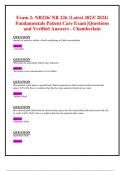
-
Exam 2: NR226/ NR 226 (Latest 2023/ 2024) Fundamentals Patient Care Exam |Questions and Verified Answers - Chamberlain
- Exam (elaborations) • 33 pages • 2023
- Available in package deal
-
- $11.79
- 1x sold
- + learn more
Exam 2: NR226/ NR 226 (Latest 2023/ 2024) Fundamentals Patient Care Exam |Questions and Verified Answers - Chamberlain QUESTION amount of particles within a fluid contributing to fluid concentration Answer: osmolality QUESTION What does an osmolality imbal- ance indicate? Answer: the blood is too concentrated or is too dilute QUESTION this solution is the same as normal body fluid composition; fluid remains inside intravascular space; 0.9% NS; this is a solut...
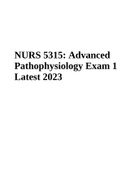
-
NURS 5315: Advanced Pathophysiology Exam 1 Latest 2023
- Exam (elaborations) • 25 pages • 2023
- Available in package deal
-
- $16.49
- 6x sold
- + learn more
NURS 5315: Advanced Pathophysiology Exam 1 Latest 2023. cells increase in number, mitosis (cell division) must occur, size of cell does not change Phys: increased rate of division, increase in tissue mass after damage or partial resection; may be compensatory, hormonal, or pathologic Patho: abnormal proliferation of normal cells usually caused by increased hormonal stimulation (endometrial). increase of production of local growth factors Ex: removal of part of the liver lead to hyperplasia...
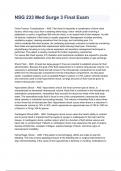
-
NSG 233 Med Surge 3 Final Exam Questions With Verified Solutions
- Exam (elaborations) • 14 pages • 2023
- Available in package deal
-
- $10.49
- 1x sold
- + learn more
NSG 233 Med Surge 3 Final Exam Questions With Verified Solutions Chest Trauma- Complications - ANS Flail chest is frequently a complication of blunt chest trauma, which may occur from a steering wheel injury, motor vehicle crash involving a pedestrian or cyclist, a significant fall onto the chest, or an assault with a blunt weapon. As with rib fracture, treatment of flail chest is usually supportive. Management includes providing ventilatory support, clearing secretions from the lungs, and co...
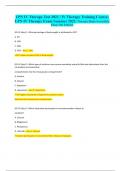
-
LPN IV Therapy Test 2022 / IV Therapy Training Course; LPN IV Therapy Exam Summer 2022. Therapy Made Incredibly Easy! 4th Edition
- Exam (elaborations) • 39 pages • 2023
-
- $11.49
- 1x sold
- + learn more
LPN IV Therapy Test 2022 / IV Therapy Training Course; LPN IV Therapy Exam Summer 2022. Therapy Made Incredibly Easy! 4th Edition Document Content and Description Below (Ch 01 Quiz) 1. What percentage of body weight is attributed to ECF? A. 5% B. 10% C. 20% D. 40% - Ans-C. 20% • ECF makes up about 20% of body weight. (Ch 01 Quiz) 2. Which type of solution rai ses serum osmolarity and pulls fluid and electrolytes from the intracellular and interstitial compartments into the intravascular comp...
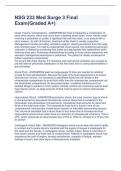
-
NSG 233 Med Surge 3 Final Exam(Graded A+)
- Exam (elaborations) • 15 pages • 2023
-
- $11.99
- 1x sold
- + learn more
Chest Trauma- Complications - ANSWERSFlail chest is frequently a complication of blunt chest trauma, which may occur from a steering wheel injury, motor vehicle crash involving a pedestrian or cyclist, a significant fall onto the chest, or an assault with a blunt weapon. As with rib fracture, treatment of flail chest is usually supportive. Management includes providing ventilatory support, clearing secretions from the lungs, and controlling pain. For mild-to-moderate flail chest injuries, the un...
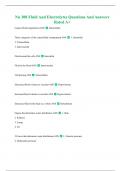
-
Nu 308 Fluid And Electrolytes Questions And Answers Rated A+
- Exam (elaborations) • 17 pages • 2024
- Available in package deal
-
- $13.99
- + learn more
Nu 308 Fluid And Electrolytes Questions And Answers Rated A+ Largest fluid compartment ANS Intracellular Three categories of the extracellular compartment ANS 1. Interstitial 2. Transcellular 3. Intravascular Fluid around the cells ANS Interstitial Fluid in the blood ANS Intravascular 3rd Spacing ANS Transcellular Decreased blood volume in vascular ANS Hypovolemia
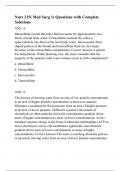
-
Nurs 215( Med Surg 1) Questions with Complete Solutions
- Exam (elaborations) • 62 pages • 2024
-
- $17.49
- + learn more
ANS: A Intracellular (inside the cells) fluid accounts for approximately two thirds of total body water. Extracellular (outside the cells) is approximately one third of the total body water. Intravascular fluid (liquid portion of the blood) and transcellular fluid are two major divisions of the extracellular compartment. Correct Answer-A patient has dehydration. While planning care, the nurse considers that the majority of the patient's total water volume exists in with compartment? a. Intra...
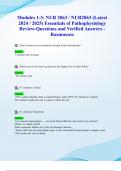
-
Modules 1-3: NUR 2063 / NUR2063 (Latest 2024 / 2025) Essentials of Pathophysiology Review-Questions and Verified Answers - Rasmussen
- Exam (elaborations) • 37 pages • 2024
- Available in package deal
-
- $10.99
- + learn more
Modules 1-3: NUR 2063 / NUR2063 (Latest 2024 / 2025) Essentials of Pathophysiology Review-Questions and Verified Answers - Rasmussen Q: Fluid excretion occurs primarily through which mechanisms? Answer: Urination and sweating Q: Which area of the body accounts for the highest loss of daily fluids? Answer: The urinary tract Q: IV solutions: Isotonic Answer: 0.9% sodium chloride (NS), Lactated Ringers (LR), D5W (5% Dextrose in Water) The solution outside the cell is...

Did you know that on average a seller on Stuvia earns $82 per month selling study resources? Hmm, hint, hint. Discover all about earning on Stuvia


